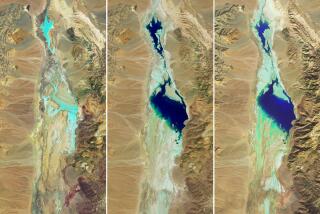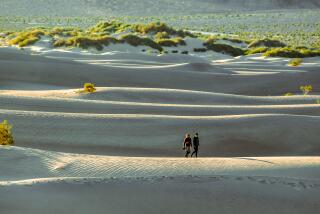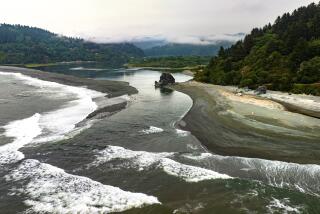North Dakota Lake Expands Along With Town’s Economy
MINNEWAUKAN, N.D. — North Dakota’s largest natural lake has been an economic godsend, luring anglers and other sportsmen from California, Florida, Colorado and Arizona to this tiny community that once relied solely on farming.
But as paradoxes go, the rising waters of Devils Lake have also bedeviled the town in the last decade, forcing some families who have lived here for generations to set down roots elsewhere. In more recent weeks, rains left in their wake flooded basements and a boulevard full of ruined rugs and recliners.
Rains filled the lake to record levels, and water has reached areas it never had in Minnewaukan’s 121-year history.
“We’re not giving up, but if it gets any higher we’re in trouble,” said state Sen. Mike Every, who is also the town’s mayor. “The harder it rains, the more we clench our teeth.”
Jim and Diane Yri have lost more than 1,100 acres of farmland to Devils Lake, which has more than doubled in size. “We had to do something, or pack up and leave,” said Jim Yri, whose family has farmed near Minnewaukan for five generations. The couple built six cabins. Their West Bay Resort now caters to out-of-state fishermen who come to town for walleye, perch and pike. In the fall and winter, they host waterfowl hunters.
Eventually, the Yris said, the income from their resort will surpass what they made farming.
“What’s happening now is people are booking for the next year before they leave,” Diane Yri said. “We decided that instead of cursing the darkness, we should light a candle.”
Thirty-four years ago, Hermoine Jorgenson bought her home on the edge of town when the lake was 16 miles away. Today, lake water laps just 50 feet from the house. Heavy rains and high winds caused the lake to breach the small break wall in early June, spilling over into her yard. It has since receded, but it still worries her.
Yet, she doesn’t want to leave.
“This is my home and where I raised my six children,” said Jorgenson, 69. “It’s been 40 years since I tried to swim, and I don’t want to try again any time soon.”
Most of Minnewaukan’s 400 or so residents also feel the lake is backing them against a wall, but they are resigned to stick it out until there is no other choice.
“It’s here, and there’s not a whole lot we can do about it,” Virgil Matthews said. “I’ve lived here 40 years and I never thought I’d ever see the water reach town.”
Devils Lake is at a record peak of 1,449.8 feet. Bruce Engelhardt, a state Water Commission engineer who grew up in Minnewaukan, said it has bulged to 138,600 acres, or about 216 square miles, up more than 17,700 acres since March.
Already, the waters had driven about a dozen families out of Minnewaukan, but Engelhardt said the town appeared to be in no immediate danger of submersion. Stump Lake, 40 miles east of Minnewaukan, can absorb some of the overflow from Devils Lake, he said.
A bigger worry, though, is that the increased water level has pushed up the underground water table, creating problems such as soggy basements, said John Bluemle, a state geologist.
The toll on roads, homes and farmland has been high. Engelhardt said the federal government spent more than $400 million to raise roads and move or protect homes in the area. A buyout was accepted by nearly all the residents in the small town of Churchs Ferry, about 13 miles northeast of Minnewaukan.
A plan for a dike around Minnewaukan was shot down several years ago; it was deemed too expensive and residents didn’t want to be boxed in, Every said.
Randy Thompson’s 4-year-old bait shop is in a building that once was a clubhouse on a nine-hole golf course. The course has been under water for years but the bait shop and convenience store have found their place in what has become something of a sportsman’s paradise. “Overall it’s been a boost for the town,” he said.
Most of Minnewaukan’s newest residents have moved from Wisconsin, Nevada, Minnesota and Iowa. Sportsmen have purchased vacation homes.
Visitors have injected millions of dollars into the city’s economy over the years, Every said. “We’re not happy the lake has done as much damage as it has and how much money it has cost,” he said. “But it’s been a blessing in disguise for this town. Nobody is getting rich, but we’re better off than we were.”
Before the lake began to rise, the town faced a declining agricultural economy. Without the lake, it’s likely the town would no longer have a supermarket, restaurant, bar or bank, Every said.
Minnewaukan received more than $2 million in federal money a few years ago to upgrade roads and its sewer system -- improvements the city would never have been able to afford, Every said.
Several years ago, Steve Chase read about the rising waters of Devils Lake from his home in Las Vegas, where he owns an art gallery. He was so intrigued after a visit to Minnewaukan that he made it his home and bought several commercial and residential buildings.
“I’m trying to help this town survive,” Chase said. “I came here because of the water. I think other people will too.”
Construction crews are the latest to arrive, building an outlet that would drain excess water into the Sheyenne River and ultimately the Red River, which forms much of the North Dakota-Minnesota border.
Minnesota and Manitoba officials worry that water from Devils Lake could contain plant and animal life that would hurt the Red River system, a claim North Dakota officials reject. Officials in the Canadian province, joined by some North Dakota opponents, are suing to stop the project and want a review by the International Joint Commission, which deals with lakes and rivers at the border.
Jim Yri holds on to the hope that the lake might recede, leaving the fertile pasture and cropland his family farmed. He will continue to pay taxes on land that has been swallowed by the lake in recent years, in case it dries out. “The only thing certain about Devils Lake,” Yri said, “is that you’d be a fool to predict what it’s going to do.”
More to Read
Sign up for Essential California
The most important California stories and recommendations in your inbox every morning.
You may occasionally receive promotional content from the Los Angeles Times.










